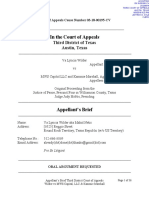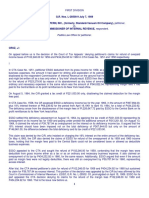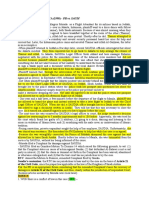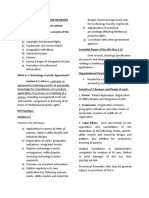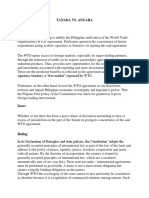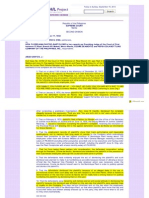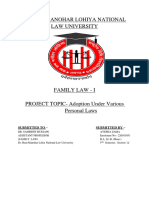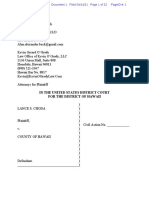Republic Vs Acebedo
Republic Vs Acebedo
Uploaded by
Maria Raisa Helga YsaacCopyright:
Available Formats
Republic Vs Acebedo
Republic Vs Acebedo
Uploaded by
Maria Raisa Helga YsaacOriginal Description:
Original Title
Copyright
Available Formats
Share this document
Did you find this document useful?
Is this content inappropriate?
Copyright:
Available Formats
Republic Vs Acebedo
Republic Vs Acebedo
Uploaded by
Maria Raisa Helga YsaacCopyright:
Available Formats
G.R. No.
L-20477
March 29, 1968
REPUBLIC OF THE PHILIPPINES, plaintiff-appellant, vs. FELIX B. ACEBEDO, defendant-appellee. FACTS: 1. This is a suit for collection of deficiency income tax for the year 1948 in the amount of P5,962.83. 2. The corresponding notice of assessment was issued on September 24, 1949. 3. The complaint was filed on December 27, 1961. 4. After the defendant filed his answer but before trial started he moved to dismiss on the ground of prescription. 5. The court received evidence on the motion, and on September 1, 1962 issued an order finding the same meritorious and hence dismissing the complaint.
6. Plaintiff appealed from the order of dismissal. ISSUE: Whether or not the right to collect has already prescribed. HELD: YES The statute of limitations which governs this case is Section 332, subsection (c), of the National Internal Revenue Code, which provides for an exemption as to the period of limitation that tax may be collected by distraint or levy or by a proceeding in court, but only if begun (1) within five years after the assessment of the tax, or (2) prior to the expiration of any period for collection agreed upon in writing by the Collector of Internal Revenue and the taxpayer before the expiration of such five-year period. The period so agreed upon may be extended by subsequent agreements in writing made before the expiration of the period previously agreed upon. The present suit was not begun within five years after the assessment of the tax, which was in 1949. Was it, however, begun prior to the expiration of any period for collection agreed upon in writing by the Commissioner of Internal Revenue and the defendant before the expiration of such five-year period? NO. The only evidence of such written agreement, in the form of a "waiver of the statute of limitations" signed by the defendant, dated December 17, 1959. But this waiver was ineffective because it was executed beyond the original five-year limitation. The plaintiff contends that the period of prescription was suspended by the defendant's various requests for reinvestigation or reconsideration of the tax assessment. The trial court rejected this contention, saying that a mere request for reinvestigation or reconsideration of an assessment does not have the effect of such suspension. The ruling is logical, otherwise there would be no point to the legal requirement that the extension of the original period be agreed upon in writing. There are certain decisions where the taxpayer may be in estoppel to claim prescription as a defense even if he has not previously waived it in writing: IN the case of CIR vs Consolidated Mining the SC ruled that when by his repeated requests or positive acts, the government has been for good reasons, persuaded to postpone collection. Likewise, when a taxpayer asks for a reinvestigation of the tax assessment issued to him and such reinvestigation is made, on the basis of which the Government makes another assessment, the five-year
period with which an action for collection may be commenced should be counted from this last assessment. In the case at bar, the defendant, after receiving the assessment notice of September 24, 1949, asked for a reinvestigation thereof on October 11, 1949. There is no evidence that this request was considered or acted upon. In fact, on October 23, 1950 the then Collector of Internal Revenue issued a warrant of distraint and levy for the full amount of the assessment at (Exh. D), but there was no follow up of this warrant. Consequently, the request for reinvestigation did not suspend the running of the period for filing an action for collection. The next communication of record is a letter signed for the defendant by one Troadio Concha and dated October 6, 1951, again requesting a reinvestigation of his tax liability (Exh. B). Nothing came of this request either. Then on February 9, 1954, the defendant's lawyers wrote the Collector of Internal Revenue informing him that the books of their client were ready at their office for examination (Exh. C). The reply was dated more than a year later, or on October 4, 1955, when the Collector bestirred himself for the first time in connection with the reinvestigation sought, and required that the defendants specify his objections to the assessment and execute "the enclosed forms for waiver, of the statute of limitations." The last part of the letter was a warning that unless the waiver "was accomplished and submitted within 10 days the collection of the deficiency taxes would be enforced by means of the remedies provided for by law." It will be noted that up to October 4, 1955 the delay in collection could not be attributed to the defendant at all. His requests in fact had been unheeded until then, and there was nothing to impede enforcement of the tax liability by any of the means provided by law. By October 4, 1955, more than five years had elapsed since assessment in question was made, and hence prescription had already set in, making subsequent events in connection with the said assessment entirely immaterial. Even the written waiver of the statute signed by the defendant on December 17, 1959 could no longer revive the right of action, for under the law such waiver must be executed within the original five-year period within which suit could be commenced.
You might also like
- Del Mundo Vs CapistranoDocument4 pagesDel Mundo Vs CapistranoRmLyn MclnaoNo ratings yet
- Gaston Vs Republic Planters BankDocument5 pagesGaston Vs Republic Planters BankRyan SuaverdezNo ratings yet
- Torts - Abesamis Vs WoodcraftDocument2 pagesTorts - Abesamis Vs WoodcraftMaria Raisa Helga YsaacNo ratings yet
- Peo Vs AcunaDocument2 pagesPeo Vs AcunaMaria Raisa Helga YsaacNo ratings yet
- Wilder v. MWS CAPITAL Court of Appeals Appellant Brief (File Stamped)Document36 pagesWilder v. MWS CAPITAL Court of Appeals Appellant Brief (File Stamped)Tonkawa of Texas Nation100% (1)
- 4 Gantan V GantanDocument8 pages4 Gantan V GantanAtty Richard TenorioNo ratings yet
- Caltex v. Commissioner, 208 SCRA 755Document5 pagesCaltex v. Commissioner, 208 SCRA 755zanjknight100% (1)
- Heng Tong Vs CirDocument3 pagesHeng Tong Vs CirMariam PetillaNo ratings yet
- Macalintal vs. ComelecDocument29 pagesMacalintal vs. ComelecPenn Angelo RomboNo ratings yet
- CIR v. PALDocument18 pagesCIR v. PALmceline19No ratings yet
- 8 Heirs of Emilio Santioque vs. Heirs of Emilio CalmaDocument3 pages8 Heirs of Emilio Santioque vs. Heirs of Emilio CalmakrizzledelapenaNo ratings yet
- MERALCO Vs Province of LagunaDocument6 pagesMERALCO Vs Province of LagunaJDR JDRNo ratings yet
- Esso V CIRDocument4 pagesEsso V CIRWinnie Ann Daquil Lomosad-MisagalNo ratings yet
- Collector vs. La TondenaDocument2 pagesCollector vs. La TondenaClaudine Allyson DungoNo ratings yet
- Civrev DigestsDocument2 pagesCivrev DigestsMaddie0% (2)
- 8 114064-2002-De - Castro - v. - Court - of - Appeals PDFDocument13 pages8 114064-2002-De - Castro - v. - Court - of - Appeals PDFCamille CruzNo ratings yet
- Barba Vs Liceo de CagaynDocument3 pagesBarba Vs Liceo de CagaynPaula GasparNo ratings yet
- Gregorio v. Court of Appeals, G.R. No. 179799, September 11, 2009Document2 pagesGregorio v. Court of Appeals, G.R. No. 179799, September 11, 2009sunshineNo ratings yet
- 15 ABS CBN vs. CTA 108 SCRA 142Document6 pages15 ABS CBN vs. CTA 108 SCRA 142Rogelio CartinNo ratings yet
- Polo V CIR DigestDocument1 pagePolo V CIR DigestKTNo ratings yet
- 2 Goitia V Campos RuedaDocument2 pages2 Goitia V Campos RuedaUlyssis BangsaraNo ratings yet
- Land Bank Vs SantiagoDocument10 pagesLand Bank Vs SantiagoPaulo Miguel GernaleNo ratings yet
- Tax Digest 3Document29 pagesTax Digest 3Patricia SanchezNo ratings yet
- 05 - Marcos II Vs Commissioner Read Full TextDocument3 pages05 - Marcos II Vs Commissioner Read Full TextJoshua Erik MadriaNo ratings yet
- Eusibio Villanueva EtDocument2 pagesEusibio Villanueva EtJenalin FloranoNo ratings yet
- Essso Vs CirDocument2 pagesEssso Vs CirCates dela RosaNo ratings yet
- Truth in LendingDocument5 pagesTruth in LendingJexelle Marteen Tumibay PestañoNo ratings yet
- People Vs Sandiganbayan and TanDocument8 pagesPeople Vs Sandiganbayan and TanDenee Vem MatorresNo ratings yet
- CIR v. Fisher ADocument30 pagesCIR v. Fisher ACE SherNo ratings yet
- Eternal Gardens Memorial Park V Philamlife Insurance Company PDFDocument15 pagesEternal Gardens Memorial Park V Philamlife Insurance Company PDFMiakaNo ratings yet
- Basilan Estates, Inc. vs. Commissioner of Internal Revenue, 21 SCRA 17, September 05, 1967Document14 pagesBasilan Estates, Inc. vs. Commissioner of Internal Revenue, 21 SCRA 17, September 05, 1967Jane BandojaNo ratings yet
- HO 10 Commercial Law Transportation LawDocument10 pagesHO 10 Commercial Law Transportation LawsikarlNo ratings yet
- CIR vs. Secretary of Justice, 808 SCRA 14 (2016)Document20 pagesCIR vs. Secretary of Justice, 808 SCRA 14 (2016)Darrel John SombilonNo ratings yet
- 1 Churchill v. ConcepcionDocument7 pages1 Churchill v. ConcepcionJoan Dela CruzNo ratings yet
- MACEDA v. MACARAIGDocument2 pagesMACEDA v. MACARAIGRose De JesusNo ratings yet
- 1 Political LawDocument49 pages1 Political LawsikarlNo ratings yet
- Antonio Vs ComelecDocument4 pagesAntonio Vs ComelecEmmanuel C. DumayasNo ratings yet
- Commissioner of Internal Revenue v. Dash Engineering Philippines, Inc.Document3 pagesCommissioner of Internal Revenue v. Dash Engineering Philippines, Inc.Rap PatajoNo ratings yet
- Consolidated Case Digests in PALE (DELIN)Document26 pagesConsolidated Case Digests in PALE (DELIN)Grace DelinNo ratings yet
- All The Requisites Are Present in This Case: TH THDocument1 pageAll The Requisites Are Present in This Case: TH THReese PeraltaNo ratings yet
- CIR V Bishop of Missionary DistrictDocument7 pagesCIR V Bishop of Missionary Districtnichols greenNo ratings yet
- Latest Case Digest StatconDocument15 pagesLatest Case Digest StatconAnasor GoNo ratings yet
- ABS-CBN Broadcasting Corp. v. CTA, 108 SCRA 143Document1 pageABS-CBN Broadcasting Corp. v. CTA, 108 SCRA 143Rhenee Rose Reas SugboNo ratings yet
- Acebedo Optical Company Vs CADocument7 pagesAcebedo Optical Company Vs CAinvictusincNo ratings yet
- Saudi Arabian Airlines v. CADocument3 pagesSaudi Arabian Airlines v. CAAliw del RosarioNo ratings yet
- Republic v. Orbecido III, G.R. No. 154380, October 5, 2005 (472 SCRA 114)Document6 pagesRepublic v. Orbecido III, G.R. No. 154380, October 5, 2005 (472 SCRA 114)Lester AgoncilloNo ratings yet
- PNB Vs Concepcion Mining PDFDocument3 pagesPNB Vs Concepcion Mining PDFClarisse Ann MirandaNo ratings yet
- Case Digest TAXDocument12 pagesCase Digest TAXCayle Andre E. Nepomuceno100% (1)
- 3 Scra 851Document4 pages3 Scra 851kelbingeNo ratings yet
- ADZUCL Incomesyllabus SY2014 15Document72 pagesADZUCL Incomesyllabus SY2014 15Benn DegusmanNo ratings yet
- Samar-I Electric Cooperative v. CIR (744 SCRA 459)Document9 pagesSamar-I Electric Cooperative v. CIR (744 SCRA 459)Karl MinglanaNo ratings yet
- Winebrenner Vs CIRDocument1 pageWinebrenner Vs CIRRodney SantiagoNo ratings yet
- Intellectual Property Law ReviewerDocument20 pagesIntellectual Property Law ReviewerRicardo EnriquezNo ratings yet
- Juasing Hardware v. MendozaDocument1 pageJuasing Hardware v. Mendozad2015memberNo ratings yet
- Taxation Problems 2020Document59 pagesTaxation Problems 2020MimiNo ratings yet
- Gonzales vs. Marcos, 65 SCRA 624 (1975)Document4 pagesGonzales vs. Marcos, 65 SCRA 624 (1975)Ghatz CondaNo ratings yet
- CIR vs. Melchor Javier, G.R. No. 78953, July 31, 1991Document4 pagesCIR vs. Melchor Javier, G.R. No. 78953, July 31, 1991Lou Ann AncaoNo ratings yet
- Republic Vs Central Surety and Po Kee KamDocument1 pageRepublic Vs Central Surety and Po Kee KamSbl IrvNo ratings yet
- MCIAA Vs Marcos Case DigestDocument3 pagesMCIAA Vs Marcos Case DigestLuigi JaroNo ratings yet
- Cantiller Vs PotencianoDocument2 pagesCantiller Vs PotencianoJan Uriel DavidNo ratings yet
- Tax Digest 51 55Document11 pagesTax Digest 51 55glaiNo ratings yet
- Digested Case of Metro Heights Subsdivision and CMS ConstructionDocument2 pagesDigested Case of Metro Heights Subsdivision and CMS ConstructionShyly Cubalan-Balbin100% (1)
- 262-Republic v. Acebedo G.R. No. L-20477 March 29, 1968Document2 pages262-Republic v. Acebedo G.R. No. L-20477 March 29, 1968Jopan SJNo ratings yet
- Professional Services Vs AganaDocument3 pagesProfessional Services Vs AganaMaria Raisa Helga Ysaac100% (2)
- Creatives Officer JDDocument1 pageCreatives Officer JDMaria Raisa Helga YsaacNo ratings yet
- Lapinid V CSC - DigestDocument2 pagesLapinid V CSC - DigestMaria Raisa Helga YsaacNo ratings yet
- Sanggunian of Brgy Don Mariano Marcos V.martinezDocument2 pagesSanggunian of Brgy Don Mariano Marcos V.martinezMaria Raisa Helga YsaacNo ratings yet
- Cayetano Vs MonsodDocument1 pageCayetano Vs MonsodJohn Eric Cabanlit LimbagoNo ratings yet
- National Power Corp Vs CA - TortsDocument2 pagesNational Power Corp Vs CA - TortsMaria Raisa Helga Ysaac100% (2)
- Worcester Vs Ocampo - DigestDocument1 pageWorcester Vs Ocampo - DigestMaria Raisa Helga YsaacNo ratings yet
- Gotesco Vs Chatto - DigestDocument1 pageGotesco Vs Chatto - DigestMaria Raisa Helga YsaacNo ratings yet
- Torts - Songco Vs SellnerDocument2 pagesTorts - Songco Vs SellnerMaria Raisa Helga Ysaac100% (1)
- Torts - MCC Vs SsangyongDocument2 pagesTorts - MCC Vs SsangyongMaria Raisa Helga Ysaac0% (1)
- National Power Corp Vs CA - TortsDocument2 pagesNational Power Corp Vs CA - TortsMaria Raisa Helga Ysaac100% (2)
- Torts - Basilan Lumber vs. Cagayan Timber - DigestDocument1 pageTorts - Basilan Lumber vs. Cagayan Timber - DigestMaria Raisa Helga YsaacNo ratings yet
- Medina vs. Castro BartolomeDocument9 pagesMedina vs. Castro BartolomeMaria Raisa Helga YsaacNo ratings yet
- Soliman Vs Tuason - DigestDocument2 pagesSoliman Vs Tuason - DigestMaria Raisa Helga Ysaac100% (3)
- LAGON Vs CA - Torts DigestDocument2 pagesLAGON Vs CA - Torts DigestMaria Raisa Helga Ysaac100% (1)
- Manliclic V CalaunanDocument3 pagesManliclic V CalaunanMaria Raisa Helga Ysaac100% (2)
- Vda. de Bautista V MarcosDocument1 pageVda. de Bautista V MarcosMaria Raisa Helga YsaacNo ratings yet
- Maninang V CADocument2 pagesManinang V CAMaria Raisa Helga YsaacNo ratings yet
- Sps Suico Vs PNBDocument3 pagesSps Suico Vs PNBMaria Raisa Helga YsaacNo ratings yet
- CIR Vs Philippine Global CommunicationDocument3 pagesCIR Vs Philippine Global CommunicationMaria Raisa Helga YsaacNo ratings yet
- Cir Vs Visayan Electric CoDocument2 pagesCir Vs Visayan Electric CoMaria Raisa Helga YsaacNo ratings yet
- City of Manila V GarciaDocument2 pagesCity of Manila V GarciaMaria Raisa Helga YsaacNo ratings yet
- Digests IDocument3 pagesDigests IMaria Raisa Helga YsaacNo ratings yet
- 1.EVERYTHING About IPRDocument49 pages1.EVERYTHING About IPRjack thompsyNo ratings yet
- S.I. 11 of 2019 Magistrates Court (Civil) Rules, 2018Document180 pagesS.I. 11 of 2019 Magistrates Court (Civil) Rules, 2018Sandra DziwaniNo ratings yet
- Financial Building Corporation v. Forbes Park AssociationDocument2 pagesFinancial Building Corporation v. Forbes Park AssociationMaria Analyn0% (1)
- (eBook PDF) Comparative Criminal Justice Systems 5th Edition download pdfDocument56 pages(eBook PDF) Comparative Criminal Justice Systems 5th Edition download pdffoqrazoupas100% (1)
- 10 - PEZA V Edison (Bataan) Cogeneration Corporation - FulguerasDocument2 pages10 - PEZA V Edison (Bataan) Cogeneration Corporation - FulguerasShane Fulgueras100% (1)
- Hire PurchaseDocument19 pagesHire PurchaseGREGORY CHISHANo ratings yet
- Sarimanotes 5Document12 pagesSarimanotes 5owenNo ratings yet
- Laurel v. Abrograr GR No. 155076, January 13, 2009Document2 pagesLaurel v. Abrograr GR No. 155076, January 13, 2009Mikail Lee BelloNo ratings yet
- SpecPro Recit 5Document71 pagesSpecPro Recit 5Michelle Anne OlivaNo ratings yet
- Blue Bells Model School Question Bank SESSION: 2021-22 Class-Viii Subject: Social ScienceDocument6 pagesBlue Bells Model School Question Bank SESSION: 2021-22 Class-Viii Subject: Social ScienceRiya AggarwalNo ratings yet
- REJ Da Oi - SADocument38 pagesREJ Da Oi - SAPablo HierroNo ratings yet
- International Organizations and International LawDocument28 pagesInternational Organizations and International LawYossuda RaicharoenNo ratings yet
- Maniago v. de DiosDocument2 pagesManiago v. de Diosaudreydql5No ratings yet
- Case Digests Arts 34 35 36Document6 pagesCase Digests Arts 34 35 36King KuntaNo ratings yet
- G.R. No. 203984 - Warrantless Search Plain View DoctrineDocument10 pagesG.R. No. 203984 - Warrantless Search Plain View DoctrineJeffrey L. OntangcoNo ratings yet
- Case 1Document6 pagesCase 1Rusty NomadNo ratings yet
- Petition To Post Bail 1Document3 pagesPetition To Post Bail 1Paralegal JGGCNo ratings yet
- Case On Dog AttackDocument47 pagesCase On Dog Attacksheronfeddrin00No ratings yet
- Permission Is Granted Subject To The Following ConditionsDocument2 pagesPermission Is Granted Subject To The Following ConditionsShankar BanrwalNo ratings yet
- Judgment AnalysisDocument5 pagesJudgment AnalysisNidhi HadvaidNo ratings yet
- Family Law I ProjectDocument27 pagesFamily Law I ProjectAayushi TomerNo ratings yet
- Choda Complaint Filed-CombinedDocument54 pagesChoda Complaint Filed-CombinedDuncanNo ratings yet
- OtcDocument3 pagesOtcNick ReismanNo ratings yet
- Thesis WarrantDocument6 pagesThesis Warrantsharonleespringfield100% (2)
- Sample For Pleading File (Plaintiff - Defendant)Document4 pagesSample For Pleading File (Plaintiff - Defendant)Cindy SimangunsongNo ratings yet
- ATENEO EvidenceDocument51 pagesATENEO Evidencevanessa pagharion100% (10)
- Power of Positive Thinking EssayDocument7 pagesPower of Positive Thinking Essayafiboeolrhismk100% (2)
- GR No. 86995 and GR No. L-57883 (Administrative Law Case Digest)Document4 pagesGR No. 86995 and GR No. L-57883 (Administrative Law Case Digest)Maestro Lazaro100% (1)
- wcl-20-24 11 2023Document15 pageswcl-20-24 11 2023Codarren VelvindronNo ratings yet




